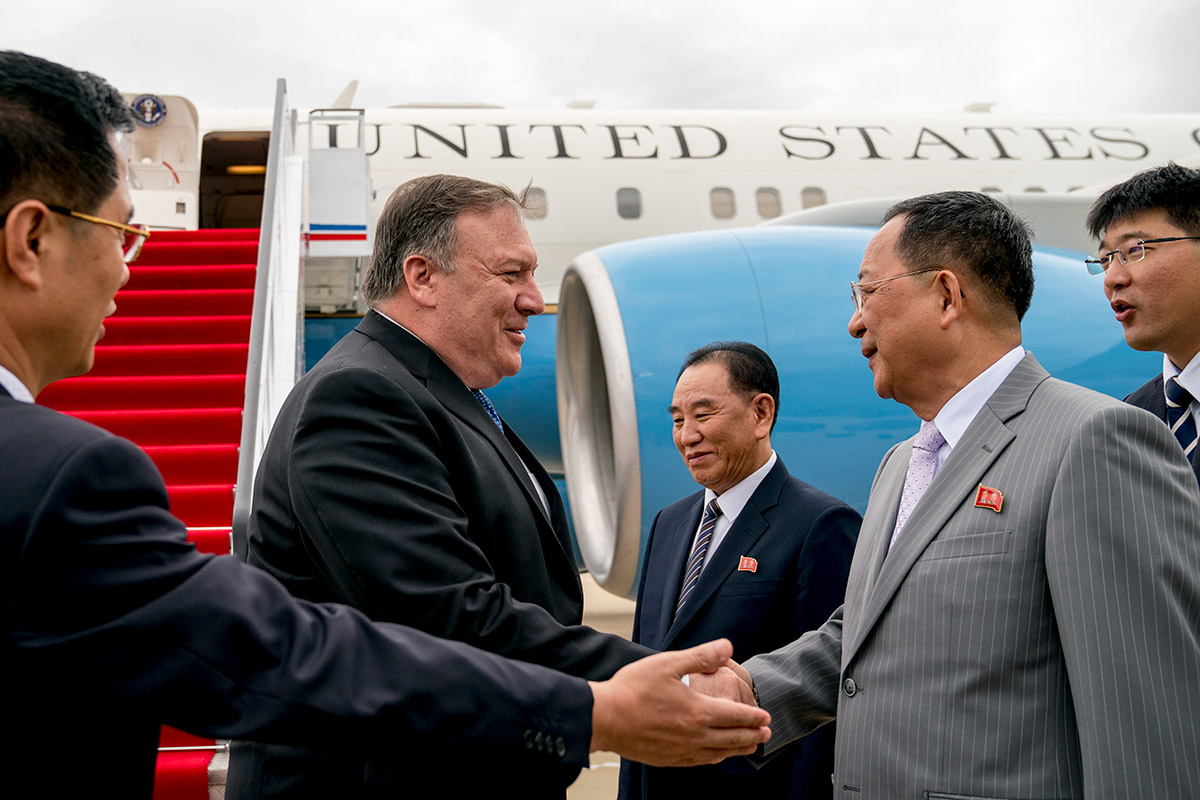United States (US) Secretary of State, Mike Pompeo is back in Pyongyang for his third visit to the hermit kingdom, for further discussions on denuclearisation on the back of the historic summit between the leaders of both states in Singapore last month.
Since that meeting, Trump has remained optimistic on the prospect that North Korea will hold up their end of the bargain and give up its nuclear arsenal. However, the joint statement signed by the two leaders was not reflective of any specific commitments.
Pompeo is tasked with continuing negotiations with North Korea and coming up with an agreeable timeline for denuclearisation. Washington has expressed hope for a “complete” denuclearisation within a year. However, experts believe that it could take much longer given North Korea’s previous penchant for reneging on such commitments.
What is on Pompeo’s plate?
A key point of contention is a definition debate surrounding the term “denuclearisation.” Pyongyang had so far agreed to a “complete denuclearisation of the Korean Peninsula” which falls short of the US’ demand for a “complete, verifiable and irreversible dismantlement” (CVID). Pompeo stated that his meeting this time will be to “fill in some details” of the commitments to denuclearise and “continue the momentum” of what was agreed upon last month in Singapore.
There is also the risk that North Korea might renege on its promise as was done previously under the administration of Kim’s father, Kim Jong Il. A report by America broadcaster, NBC recently quoted US officials who believe that Pyongyang has increased its production of fuel for nuclear weapons at multiple secret sites in recent months. If this is indeed true, it could mean that Kim’s regime is looking to squeeze as much as it can from the Trump administration whilst not letting go of its nuclear capabilities.
According to Korean security affairs expert, Hoo Chiew-Ping, besides denuclearisation, Pompeo may want to reassure Kim of the type of “guarantee” that Washington is able to provide at this stage.
“For North Korea, both CVID and complete, verifiable, and irreversible guarantee (CVIG) should be discussed simultaneously,” she told The ASEAN Post, adding that, “the prospect of a peace treaty, security guarantee or normalization of US-North Korea relations were not raised at the summit last month.”

Source: Various sources
“Thus, to move things forward, North Korea or Kim Jong-un would expect some form of guarantee at this meeting,” she concluded.
The issue of returning the remains of US soldiers who went missing in North Korea during the 1950-53 Korean War will also be high on the agenda. A little more than a week after the summit, Trump said that Pyongyang had repatriated the remains of 200 US soldiers who went missing during the war. According to the Department of Defense POW/MIA Accounting Agency nearly 7,700 US servicemen are still unaccounted for from the Korean War and close to 5,300 are believed to be in North Korean territory.
Positive developments or cause for concern?
Trump’s compliments about Kim have made many observers uneasy. Some have even questioned the President’s moral integrity for not addressing the brutality of Kim’s rule. Likewise, Kim had nice words to say about Trump. The apparent cordiality that they have for each other is concerning to say the least.
Hoo also has her fair share of concern over the US making too many uncertain concessions to the North Korean regime. She opined that both, the US and South Korea should approach the situation cautiously, warning that both governments “have to be careful of the fine line between engagement and appeasement.”
“Seoul has been careful in ensuring coercive measures such as the sanctions remain in place – to portray a stern posture – while simultaneously trying to assure North Korea of the benefits in joint political, military and economic cooperation,” she explained.
The Trump administration has vowed to keep its economic sanctions on North Korea in place which they believe was what forced North Korea to the negotiating table in the first place. According to Hoo, South Korean President Moon Jae-in has also been persuading Pyongyang to place its trust in Washington to facilitate the possibility of US or international inspection of nuclear sites in North Korea.
“This would then allow partial sanctions to be lifted and begin the implementation of plans proposed by the South on inter-Korean reconciliation and economic assistance,” she added.
